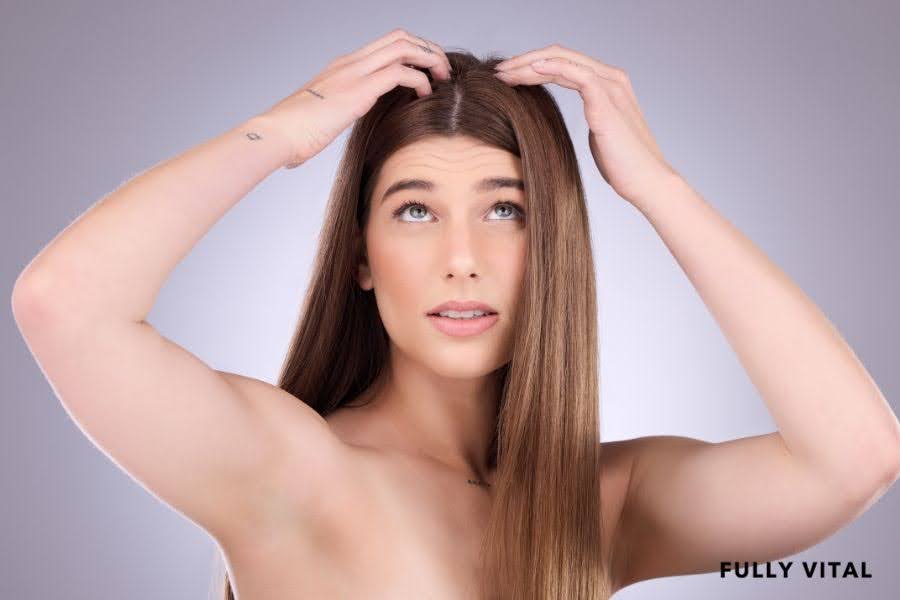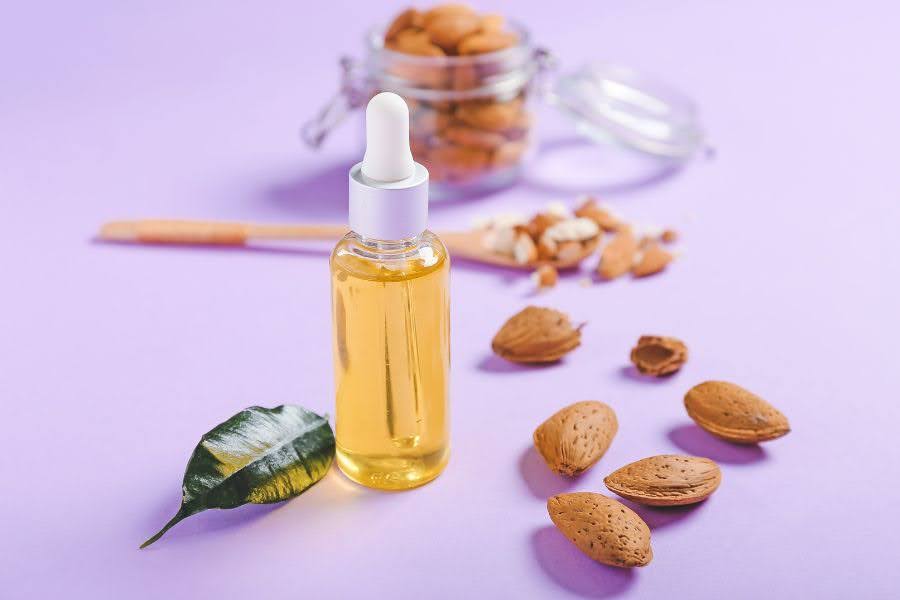
Tender Spot On Scalp: Causes, Treatments, And Prevention Strategies
A tender spot on your scalp can be a sign that something is not right.
In this article, we'll discuss the reasons you might have scalp pain, how to treat it, and how to keep it from happening again.
Understanding and taking care of your scalp is important for your overall health and can help keep your hair healthy too.
Let's find out what can cause these sore spots on your scalp and what you can do about them.
Experience relief from scalp tenderness and support hair growth with Fully Vital's mindfully crafted hair care solutions.

I LOVE MY HAIR NOW
FullyVital hair serum and hair vitamins made tremendous improvements in my hair. I truly love my hair now.
Shop Hair ProductsUnderstanding Scalp Tenderness
Scalp tenderness refers to a sensitivity that can cause significant discomfort or even pain in isolated areas of the scalp.
It can be a sharp, shooting pain, a constant ache, or a sensitivity that's felt only when the area is touched or when hair is moved.
Though it may seem trivial, tenderness on the scalp can be a symptom of various underlying issues—ranging from benign to more severe.
Recognizing the nature and intensity of this tenderness is vital for determining how to approach treatment.
Understanding its characteristics, such as whether it is acute or chronic, can also inform whether there's a need for medical intervention.
This knowledge empowers individuals to manage their condition more effectively and seek care when necessary.
Common Symptoms Accompanying Scalp Tenderness
A tender spot on the scalp might also manifest other symptoms that can help pinpoint the underlying cause.
Common accompanying symptoms include redness, which can indicate inflammation or irritation, and swelling, which could suggest an injury or infection.
Some people experience a visible rash or localized hair loss, adding another layer of complexity to their condition.
An itchy or burning sensation can also accompany the tenderness, potentially leading to excessive scratching, which further irritates the scalp.
It's crucial to monitor these symptoms closely as they can evolve over time, and their progression can offer clues for diagnosis and treatment.
Potential Causes Of Scalp Tenderness
Skin Conditions
Skin conditions such as dermatitis, which encompasses various types of skin inflammation, or psoriasis, an autoimmune condition characterized by rapid skin cell turnover, are common culprits of scalp discomfort.
These conditions often lead to itchy, flaky patches that become tender when scratched or irritated.
The discomfort can be exacerbated by certain hair care products or environmental factors that further inflame the sensitive skin.
Understanding the specific skin condition is key to managing scalp tenderness, as each requires a tailored approach to treatment.
It's also crucial to be aware that skin conditions of the scalp can often be chronic and may require ongoing management.
Infections And Infestations
Scalp tenderness can also stem from infections such as ringworm, which is not a worm but a fungal infection that creates circular, tender patches on the scalp.
Bacterial infections can cause painful, swollen spots that may ooze or crust over.
Infestations, like lice, contribute to tenderness due to the incessant itching they cause, leading to skin abrasions and possible secondary infections from scratching.
Immediate and appropriate treatment for infections and infestations is critical to prevent worsening symptoms and to avoid spreading the condition to others.
Identifying and addressing these issues promptly can mitigate discomfort and promote healing.
Physical Trauma
Physical trauma to the scalp, whether it's from an accidental hit or from habitual practices like hair pulling or tight hairstyles, can produce acute tender spots.
Repeated or significant trauma can damage the hair follicles or skin, creating long-term sensitivity.
Even routine actions such as brushing or blow-drying can exacerbate scalp tenderness if the scalp has been subjected to physical stress.
Awareness of how daily habits impact scalp health can help in preventing trauma-induced tenderness.
In cases of injury, allowing the affected area time to heal and avoiding further stress on the scalp is important for recovery.
Neurological Causes
Neurological causes like trigeminal neuralgia, a chronic pain condition affecting the trigeminal nerve in the face, can lead to sharp, shooting pain in the scalp.
Migraines are another potential cause, where the scalp becomes so sensitive that even a light touch can be painful.
This condition is referred to as allodynia. Issues within the nervous system can make the scalp hyper-reactive, leading to tenderness with or without additional neurological symptoms.
As these conditions are complex, they require a healthcare provider’s expertise to diagnose and manage them effectively.
Appropriate treatment can significantly improve quality of life for those suffering from neurological causes of scalp tenderness.
Other Underlying Health Issues
Scalp tenderness can sometimes be a symptom of underlying health issues that affect the body more broadly.
Autoimmune diseases, for instance, can involve the scalp, leading to inflammation and pain.
Fibromyalgia, a disorder characterized by widespread musculoskeletal pain, can also include the scalp within its spectrum of symptomatic tender points.
Hormonal imbalances and nutritional deficiencies are additional factors that can manifest as scalp discomfort.
Recognizing and addressing these underlying health issues is often crucial to alleviating scalp tenderness and can help in preventing the condition from becoming a chronic hindrance.
Diagnostic Approach
When To See A Doctor
If you've tried addressing scalp tendness at home with no improvement, it's time to see a doctor.
Persistent pain, especially when accompanied by other symptoms like hair loss, flaking, or lesions, could point to a more serious condition.
It's also advisable to consult a professional if the tender area changes in appearance or if it starts to affect your sleep or daily activities.
A healthcare provider can assess your symptoms and conduct the necessary tests to diagnose the underlying cause.
Early intervention can prevent potential complications and help guide you to the most effective treatment.
What To Expect During The Consultation
Your doctor will likely start by asking about your symptoms, medical history, and any potential triggers you've identified.
This could include questions about recent illnesses, stress levels, hair care practices, and any products used on your hair or scalp.
A physical examination will follow, where the doctor may inspect your scalp for signs of inflammation, infection, or other abnormalities.
Depending on the findings, further diagnostic tests such as blood work or a skin biopsy may be recommended.
Understanding the diagnostic process can help alleviate any anxiety about the consultation and encourage a proactive attitude toward scalp health.

Treatment Options
Medications
Depending on the diagnosis, your doctor may prescribe medications to treat the underlying cause of your scalp tenderness.
This could include topical treatments like lotions, ointments, or shampoos designed to address skin conditions or infections.
For systemic issues, oral medications such as antibiotics, antifungals, or anti-inflammatory drugs may be necessary.
It's important to use these medications as directed and to complete any prescribed course of treatment, even if symptoms improve before the medication is finished.
Home Remedies
In addition to medical treatments, certain home remedies may provide relief and aid in healing.
Gentle scalp massages, using mild and hypoallergenic hair care products, and avoiding harsh treatments can help reduce irritation.
Keeping the scalp clean and dry is generally recommended, but it's important to avoid excessive washing, which can strip the scalp of natural oils and exacerbate tenderness.
Natural remedies like warm compresses can provide comfort, while over-the-counter pain relievers may help manage discomfort.
However, these should not replace professional medical advice or treatment.
Alternative Therapies
While some individuals may find relief through alternative therapies such as acupuncture or essential oils, it’s crucial to approach these with caution.
Some alternative treatments lack rigorous scientific evidence to support their effectiveness.
Before pursuing any alternative therapy, discuss it with your healthcare provider to ensure it's safe and appropriate for your particular condition.
Integrating holistic practices should complement, not replace, conventional medical treatment, and should be part of a broader health care plan.
Prevention Strategies
Scalp Care Best Practices
Maintaining a healthy scalp is essential for prevention.
Regularly washing your hair with a gentle shampoo, avoiding overly tight hairstyles, and minimizing the use of heat styling tools can help preserve scalp health.
Nutrition also plays a role; a diet rich in essential vitamins and minerals supports healthy skin and hair.
If you're prone to scalp issues, consider hypoallergenic products and limit exposure to potential irritants like certain chemicals and fragrances.
Lifestyle Adjustments
Stress can exacerbate many health conditions, including those affecting the scalp.
Incorporating stress-reduction techniques like exercise, meditation, or deep-breathing exercises can be beneficial.
Adequate sleep and hydration are also important, as is avoiding smoking and excessive alcohol consumption.
These lifestyle adjustments can have a positive impact on overall health and, by extension, scalp health.

Risks And Complications
Ignoring Scalp Tenderness
Neglecting scalp tenderness can lead to a myriad of problems down the line.
What starts as a localized spot of discomfort could evolve into widespread inflammation or secondary skin infection due to neglected care or repeated scratching.
When underlying conditions such as skin disorders or systemic diseases are the root cause, failing to seek treatment can result in the progression of these conditions, potentially complicating your overall health.
It's critical to be proactive and attentive to changes in your scalp's health to mitigate the risks of long-term complications.
Improper Treatment Attempts
Using home remedies or over-the-counter products without a clear diagnosis can sometimes do more harm than good.
Some treatments may aggravate the condition, leading to increased tenderness, irritation, or even allergic reactions.
Self-medicating, especially with potent topical or oral medications without medical guidance, can result in unwanted side effects and may delay the healing process.
It is essential to receive a proper diagnosis and treatment plan tailored to your specific condition to avoid these pitfalls.
Integrating Scalp Health Into Your Wellness Routine
Scalp health is an often neglected aspect of personal care routines.
However, regular scalp examination should be as routine as skin checks or dental visits.
Keeping an eye out for any changes in your scalp, such as new tender spots or changes in hair texture, can help catch potential problems early.
A balanced diet, regular washing with suitable products, and minimizing environmental stresses can contribute to a healthy scalp.
Taking the time to incorporate scalp care into your overall wellness routine can prevent many issues and contribute to your general health and well-being.
Discover The Secret To Ageless Hair With Fully VitalReady to revolutionize your hair care routine? Embrace the pinnacle of hair wellness with Fully Vital's innovative hair growth products—your ally in the battle against time. Let's unlock the reasons to make our solution a staple in your self-care arsenal:
Take Action for Your Hair’s Future Don’t just dream of ageless hair—make it reality. Seize the day and integrate Fully Vital's breakthrough products into your hair care routine. Say goodbye to aging hair and hello to a transformative journey toward unyielding strength and luster. |
Final Thoughts On Tender Spot On Scalp
We've discussed several aspects of scalp tenderness, from understanding the condition to exploring causes and treatment options.
We've also emphasized the importance of preventive care and integrating scalp health into a holistic wellness approach.
While a tender spot on the scalp can be a minor nuisance, it can also signal more serious health issues.
Prompt attention and appropriate care can not only provide relief but also prevent future complications.
Prioritizing your scalp health is not just about comfort; it's an essential part of maintaining your body's well-being.
A tender scalp deserves tender care.
Trust in Fully Vital's hair growth products to soothe your scalp and foster robust hair.
Check our recent blogs:
- Nourish Your Hair Naturally: Coconut Oil Hair Mask Secrets
- Expert Advice From Trichologists: Transforming Your Hair Care Regimen
- Step-By-Step: How To Nail The Perfect Korean Perm
Frequently Asked Questions About Tender Spot On Scalp
What could be causing a tender spot on my scalp?
Causes can range from skin conditions like dermatitis or psoriasis, infections, physical trauma, neurological issues, or other underlying health problems such as autoimmune disorders.1
Should I see a doctor for a tender spot on my scalp?
Yes, if the tenderness is persistent, worsening, or accompanied by other symptoms like hair loss, flaking, or inflammation, you should seek medical advice.2
How is scalp tenderness diagnosed?
Diagnosis can include an assessment of symptoms, a physical examination of the scalp, medical history review, and possibly skin tests or blood work.3
What are some common treatments for scalp tenderness?
Treatments can include medications like topical ointments or shampoos, oral antibiotics or anti-inflammatory drugs, home remedies, or in some cases, alternative therapies.
Always seek professional guidance before starting treatment.4
Can stress cause scalp tenderness?
Stress can exacerbate scalp issues, so managing stress through lifestyle changes can be a helpful preventive strategy.5
Are there any home remedies for scalp tenderness?
Gentle scalp massages, using mild hair care products, warm compresses, and avoiding harsh treatments can provide relief.
However, these should complement professional treatment plans.6
Can changing my diet improve scalp health?
Yes, a balanced diet rich in essential nutrients supports healthy skin and hair, which can improve scalp health.7
What precautions can I take to prevent scalp tenderness?
Maintain good scalp hygiene, use suitable hair care products, avoid tight hairstyles and over-styling, and protect your scalp from extreme temperatures and sun exposure.8
Can hair care products cause scalp tenderness?
Certain hair care products, particularly those containing harsh chemicals or fragrances, can irritate the scalp, leading to tenderness.9
When should I be concerned about a tender spot on my scalp?
If the tenderness does not improve with basic care, if it is severe, rapidly worsening, or if you experience other symptoms like swelling or hair loss, you should be concerned and see a healthcare provider.10
Sources:
- American Academy of Dermatology Association. (n.d.). Scalp psoriasis. Retrieved from https://www.aad.org/public/diseases/psoriasis/what/scalp-psoriasis
- Mayo Clinic. (2021). Trigeminal neuralgia. Retrieved from https://www.mayoclinic.org/diseases-conditions/trigeminal-neuralgia/symptoms-causes/syc-20353344
- Cleveland Clinic. (n.d.). Ringworm of the scalp (tinea capitis). Retrieved from https://my.clevelandclinic.org/health/diseases/10945-ringworm-of-scalp-tinea-capitis
- The National Migraine Foundation. (n.d.). Allodynia: When Touch Hurts But Shouldn't. Retrieved from https://migraineresearchfoundation.org/about-migraine/migraine-symptoms/allodynia/
- American Hair Loss Association. (n.d.). Women’s Hair Loss / Diagnosis and Treatment. Retrieved from https://www.americanhairloss.org/womenhairloss/diagnosis_treatment.html
- National Center for Biotechnology Information. (2020). Understanding fibromyalgia and its related disorders. Retrieved from https://www.ncbi.nlm.nih.gov/pmc/articles/PMC2938897/
- National Eczema Association. (n.d.). Eczema causes and triggers. Retrieved from https://nationaleczema.org/eczema/causes-and-triggers-of-eczema/
- Anxiety and Depression Association of America. (n.d.). Stress Management. Retrieved from https://adaa.org/tips
- The Trichotillomania Learning Center. (n.d.). Hair Pulling: What is trichotillomania? Retrieved from https://www.bfrb.org/learn-about-bfrbs/trichotillomania
- Harvard Health Publishing. (n.d.). Treating female pattern hair loss. Retrieved from https://www.health.harvard.edu/staying-healthy/treating-female-pattern-hair-loss








